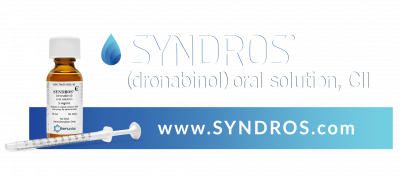Frequently Asked Questions
A Quick Source for All of Your Most Relevant Questions
Below are our most frequently asked questions. If you have a question that is not answered below, feel free to contact us using the form on our contact page.
How is SYNDROS administered?
As a liquid solution, SYNDROS is administered through a syringe, directly in your mouth. Be sure to read the Instructions for Use to properly administer your SYNDROS prescription.
How should I store SYNDROS?
Store in a refrigerator between 2°C and 8°C (36°F and 46°F); excursions permitted up to 25°C (77°F). After the bottle is opened, SYNDROS can be stored at room temperature, between 68°F to 77°F (20°C to 25°C), for up to 42 days. Store the bottle and syringe in the carton it comes in. Do not use SYNDROS that has been stored in the refrigerator or at room temperature 42 days after opening the bottle. Write the date that you open the bottle of SYNDROS on the bottle and carton it comes in. Discard unused portion 42 days after first opening. Keep SYNDROS and all medicines out of the reach of children.
How should I take SYNDROS?
- Always use the oral syringe that comes with your SYNDROS oral solution to measure your prescribed dose. Ask your doctor or pharmacist to show you how to measure your prescribed dose.
- Take SYNDROS exactly as your doctor tells you to. Your doctor may change your dose after seeing how it affects you. Do not change your dose unless your doctor tells you to change it.
- If you take SYNDROS oral solution by mouth, drink a full glass of water (6 to 8 ounces) right after you take your prescribed dose.
- If you take SYNDROS oral solution through a feeding tube, flush the feeding tube with 1 ounce (30 mL) of water using a catheter-tip syringe right after you take your prescribed dose.
- If you are an adult with AIDS with loss of appetite and weight loss: o SYNDROS is usually taken 2 times each day, 1 hour before lunch and 1 hour before dinner. If you are elderly, or unable to tolerate this dose of SYNDROS, your doctor may prescribe SYNDROS to be taken 1 time each day, 1 hour before dinner or bedtime.
- If you are an adult with nausea and vomiting caused by anti-cancer medicine:
- SYNDROS is usually taken 1 to 3 hours before your chemotherapy treatment and then every 2 to 4 hours after chemotherapy for up to 4 to 6 doses each day. If you are elderly, your doctor may prescribe SYNDROS to be taken 1 to 3 hours before your chemotherapy, 1 time each day.
- Take your first dose of SYNDROS on an empty stomach at least 30 minutes before eating. After your first dose of SYNDROS, you can take SYNDROS with or without food.
- After your doctor has decided the dose of SYNDROS that is right for you, take SYNDROS exactly at the same time before or after meals during future chemotherapy treatment.
- If you take too much SYNDROS, call your Poison Control Center at 1-800-222-1222 right away or go to the nearest emergency room.
What should I avoid while taking SYNDROS?
Do not drive, operate machinery, or do other dangerous activities until you know how SYNDROS affects you. SYNDROS taken with medicines that cause dizziness, confusion, and sleepiness may make these symptoms worse.
What are the possible side effects of SYNDROS? SYNDROS may cause serious side effects, including:
- Seizures. SYNDROS may increase your risk of seizures. Stop taking SYNDROS and call your doctor and get medical care right away if you have a seizure during treatment with SYNDROS.
- Drug and alcohol abuse. You may have an increased risk of abusing SYNDROS if you have a history of drug or alcohol abuse or dependence, including marijuana. Tell your doctor if you develop abuse behaviors such as increased irritability, nervousness, restlessness or want more or higher doses of SYNDROS during your treatment.
- Nausea, vomiting, or stomach-area (abdominal) pain. Tell your doctor if you have nausea, vomiting, or abdominal pain or if your nausea, vomiting, or abdominal pain gets worse during treatment with SYNDROS. The most common side effects of SYNDROS include:
- stomach-area (abdominal) pain
- dizziness
- feeling extremely happy (euphoria)
- nausea
- overly suspicious or feeling people want to harm you (paranoid reaction)
- sleepiness
- abnormal thoughts
- vomiting
These are not all the possible side effects of SYNDROS. Tell your doctor if you have any side effect that bothers you or does not go away. Call your doctor for medical advice about side effects. You may report side effects to FDA at 1-800-FDA-1088.
What is a Prior Authorization (PA)?
Prior Authorization is a process used by health insurance companies, Managed Care Organizations (MCOs), and third-party payers to determine whether they will cover prescribed medicines and/or procedures. There are a number of different reasons why payers require prior authorization. Some of these include an assessment of medical necessity and resource utilization reviews.
How does the Prior Authorization process work?
- A healthcare provider prescribes a medication.
- The prescription is presented at the pharmacy.
- The pharmacist enters the medication information into the computer system.
- The pharmacist may receive notification from an MCO that a Prior Authorization is required (the prescription is denied until a healthcare provider provides a justification as to why the medication is needed).
- The pharmacist informs the adult patient and calls the healthcare provider’s office.
- The healthcare provider then either allows the pharmacist to switch to a medication currently approved by the MCO, or informs the pharmacist he or she will request approval from the MCO (the Prior Authorization).
- The healthcare provider completes the appropriate forms and/or calls the MCO to seek approval.
- The MCO either approves or denies the request for medication. If denied, the healthcare provider and the adult patient may appeal the denial.
What does an adult patient have to do to seek Prior Authorization approval for SYNDROS?
Nothing. A healthcare provider or a staff member in their office will work with a Specialty Pharmacy that offers Prior Authorization Assistance.
What if the Prior Authorization is denied?
If a Prior Authorization is denied, a healthcare provider and/or the adult patient can appeal the denial to the MCO by resubmitting the Prior Authorization form and offering additional medical justification. If an adult patient and/or healthcare provider disagrees with the MCO denial, they may request an external review from a state board.
For Specialty Pharmacy Support Services including Prior Authorizations or help with the SYNDROS CARES® Free Trial Voucher and/or Discount Card Program, please contact: PREMIER PHARMACY SERVICES at 1-800-540-4700 or email SupportServices@PremierPharmacy.com
- Benuvia Operations, LLC Patient Services Center
- Call 1-877-369-5158
- Fax 1-844-793-4412
- If you have been prescribed a Benuvia product, we are here to help you. Take advantage of other resources and programs available to you such as:
- Benuvia Operations LLC’s SYNDROS CARES® Free Trial Voucher and/or Discount Card Program
What if the Prior Authorization is approved and I need assistance with the Co-Pay Program?
What if I have no insurance, are discounts available for cash-paying adult patients?
What if I need assistance finding a Specialty Pharmacy that can fill the product?
Contact Benuvia Operations LLC Patient Services Center at 1-877-369-5158

